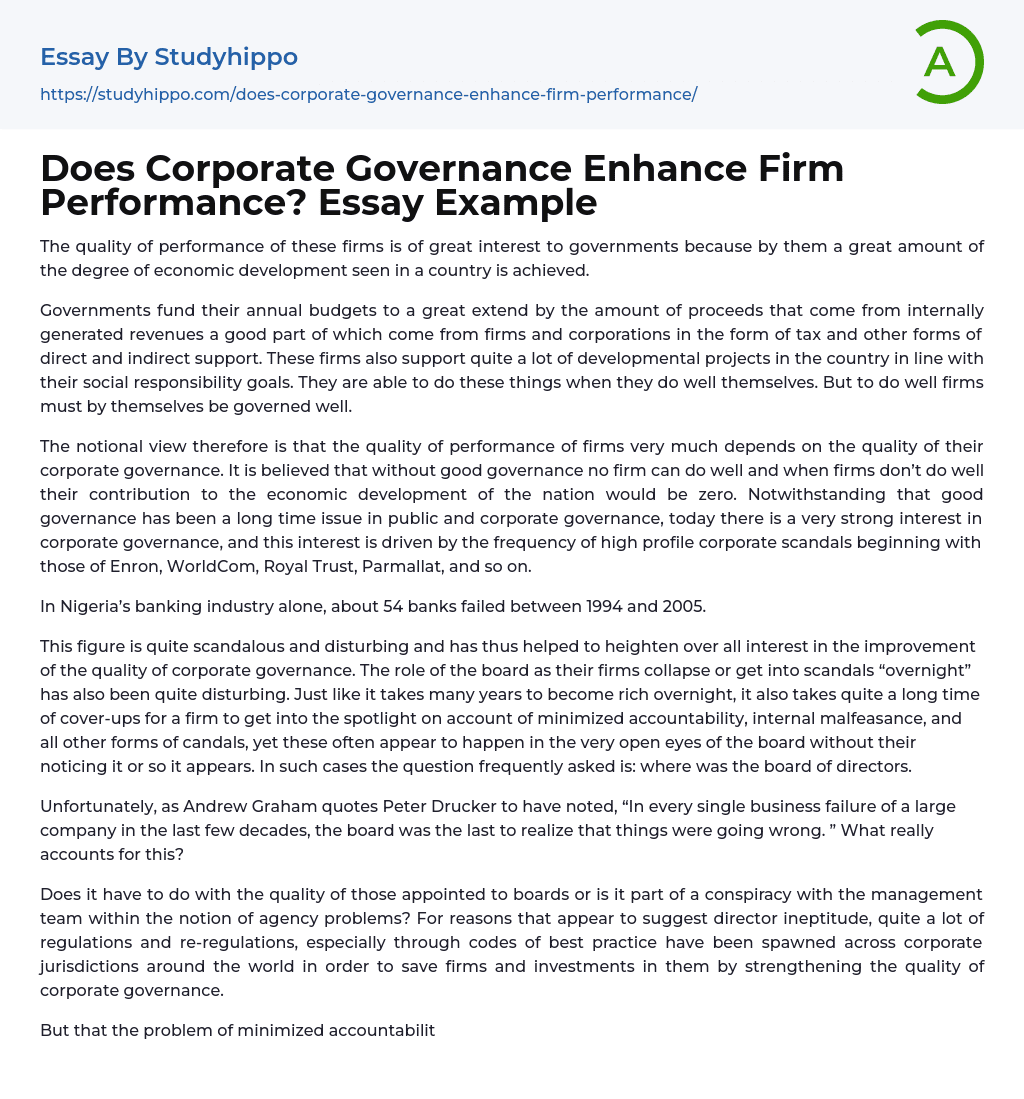

Does Corporate Governance Enhance Firm Performance? Essay Example
The quality of performance of these firms is of great interest to governments because by them a great amount of the degree of economic development seen in a country is achieved.
Governments fund their annual budgets to a great extend by the amount of proceeds that come from internally generated revenues a good part of which come from firms and corporations in the form of tax and other forms of direct and indirect support. These firms also support quite a lot of developmental projects in the country in line with their social responsibility goals. They are able to do these things when they do well themselves. But to do well firms must by themselves be governed well.
The notional view therefore is that the quality of performance of firms very much depends on the quality of their corporate
...governance. It is believed that without good governance no firm can do well and when firms don’t do well their contribution to the economic development of the nation would be zero. Notwithstanding that good governance has been a long time issue in public and corporate governance, today there is a very strong interest in corporate governance, and this interest is driven by the frequency of high profile corporate scandals beginning with those of Enron, WorldCom, Royal Trust, Parmallat, and so on.
In Nigeria’s banking industry alone, about 54 banks failed between 1994 and 2005.
This figure is quite scandalous and disturbing and has thus helped to heighten over all interest in the improvement of the quality of corporate governance. The role of the board as their firms collapse or get into scandals “overnight” has also bee
quite disturbing. Just like it takes many years to become rich overnight, it also takes quite a long time of cover-ups for a firm to get into the spotlight on account of minimized accountability, internal malfeasance, and all other forms of candals, yet these often appear to happen in the very open eyes of the board without their noticing it or so it appears. In such cases the question frequently asked is: where was the board of directors.
Unfortunately, as Andrew Graham quotes Peter Drucker to have noted, “In every single business failure of a large company in the last few decades, the board was the last to realize that things were going wrong. ” What really accounts for this?
Does it have to do with the quality of those appointed to boards or is it part of a conspiracy with the management team within the notion of agency problems? For reasons that appear to suggest director ineptitude, quite a lot of regulations and re-regulations, especially through codes of best practice have been spawned across corporate jurisdictions around the world in order to save firms and investments in them by strengthening the quality of corporate governance.
But that the problem of minimized accountability and all forms of ingenious corporate malfeasance involving managers and directors keep increasing even with all the regulatory safeguards put in place across continental divides suggests that the problems of corporate governance are not what can easily be arrested with regulations. There is need to look deep into the mindset of corporate managers and directors to find out the true problems why man must often allow his weaknesses to overcome actions for
the common good.
If we look around, we can effortlessly take an inventory of corporate directors who are inordinately rich within the dreams of avarice, and they continue to superintend over the very organizations they have consistently fleeced.
The most recent case in the United States is Bernard Madoff who ironically was also Chairman of NASDAQ. These problems have made not a few people to wonder if corporate governance now has a different meaning and purpose from what it is originally meant to be. What is Corporate Governance? The 1992 U.
K Cadbury Committee defines corporate governance as the system by which organizations are directed and controlled. The Federal Reserve Bank of Richmond defines the subject as “..
. the framework by which a company’s board of directors and senior management establishes and pursues objectives while providing effective separation of ownership and control. It includes the establishment and maintenance of independent validation mechanisms within the organization that ensure the reliability of the system of controls used by the board of directors to monitor compliance with the adopted strategies and risk tolerance. But Andrew Graham sees it as the exercise of authority, direction and control of an organization for the purpose of ensuring that it’s (the organization’s) purpose is achieved.
Thus, Good governance is about safeguarding the mission of the organization, establishing a values framework, ensuring that sound management and risk practices are in place, holding those under oversight to account and accounting to the broader public interest.
- Board Of Directors essays
- Brand Management essays
- Business Ethics essays
- Business Management essays
- Change Management essays
- Comparative Analysis essays
- Decision Making essays
- Dispute Resolution essays
- Knowledge Management essays
- Leadership essays
- Leadership and Management essays
- Manager essays
- Operations Management essays
- Performance Management essays
- Product Management essays
- Project Management essays
- Quality Management essays
- Risk essays
- Risk Management essays
- Scientific Management essays
- Stress Management essays
- supply chain management essays
- Time Management essays
- Total Quality Management essays
- Absolutism essays
- Appeal essays
- Bourgeoisie essays
- Contras essays
- Corporate Governance essays
- Corruption essays
- Democracy essays
- Democratic Party essays
- Developed Country essays
- Dictatorship essays
- Elections essays
- European Union essays
- Federalism essays
- Foreign essays
- Foreign policy essays
- Gentrification essays
- Hillary Clinton essays
- Income Tax essays
- International Relations essays
- John Marshall essays
- John Stuart Mill essays
- Left-Wing Politics essays
- Liberty essays
- Military essays
- Monarch essays
- Monarchy essays



